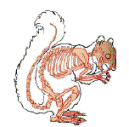
Anna Faris in The House Bunny (dir. Fred Wolf, 2008).
The logical inconsistencies are as entertaining as the intentional comedy--maybe more. Our picaresque Bunny, Shelley Darlingson (a name worthy of the heroine of a nineteenth-century novel), is an evident half-wit who takes weeks to learn how to pronounce "philanthropy" and use it correctly in a sentence, but she achieves a solid grasp on current world events and assorted academic topics in a few montage-seconds. She doesn't know that steam is hot, but she can offer an insightful impromptu apologia for a mixed metaphor involving her heart falling out of her head. She knows what a blow job is, but not a breathalyzer test.
Actually, that last one is not an inconsistency at all, I suppose, but evidence that the film depends at its base on the rudimentary mechanics of the dumb blonde joke. That is, even more than it depends on the rudimentary mechanics of the dumb blonde joke's supposed antidote, the turnabout fantasy where the dumb blonde shows her smarts in the world, proving everyone wrong. Here, as in Legally Blonde, the protagonist does exactly this, but to an even greater extent than in that film, this triumph seems beside the point. Shelley is most interesting when she is dumb, when she is safely ensconced at narrative's beginning in Hugh Hefner's Playboy Mansion, frolicking at poolside or shopping on Rodeo Drive. What's riveting is her happiness: her absolute, rapturous sense of fulfillment at being a kept rabbit. "We're the luckiest girls in the world," she gushes to a quietly envious shopkeeper, who responds with patient cordiality, "Yes, you are." The initial temptation is to read an allegorical subtext of class tension into this encounter, but which privileged slave's ideological blindness is oppressing the other's here?
Naturally Shelley's complacency must be shattered in order for the story to advance, but there's an unexamined bathos (there might be other kinds) in the shift from luxury concubinage to sorority culture. A lot could have been done with this, if anyone had thought to get really ferocious about how the Greek system functions as a training ground for the sickest ground-level domestic and cultural maneuvers of the power elite. Instead, we get the tired old distinction between the mean pretty girls and the nice nerdy girls, and the equally tired formula for how once the nerdy girls can achieve prettiness minus meanness, everything is solved.
Anna Faris almost saves the show anyway. Part of her perfectness for the role is how imperfect she is by Playboy standards: she has the stilted grace of an ostrich, and her face contorts unpredictably into various complex cheek-puffings and eye-squintings. In real life, she could never be Miss November, and when her big break finally comes in the film, we are supposed to believe that Hef has temporarily suspended his business sense, and, guided by the piercing wisdom of his benevolent sentimentality, offers her the pin-up slot out of sheer endearment. It's totally unbelievable, of course. And the movie is drivel. But bookmark Faris's expert goofiness as a small core of self-justifying value.



2 comments:
Kasey that spam says more than I ever could in a million years and being THE BEST FIGHTING SCENE!
Anyway you should watch and review Smiley Face. Anna Faris is pretty awesome in it.
And I think, if I'm qualified to say things about Godard, there's an homage to Weekend in it.
it sounds like you spent more than twenty minutes working on this review of "the house bunny"
and twenty minutes is just too much time to spend on anna faris
Post a Comment